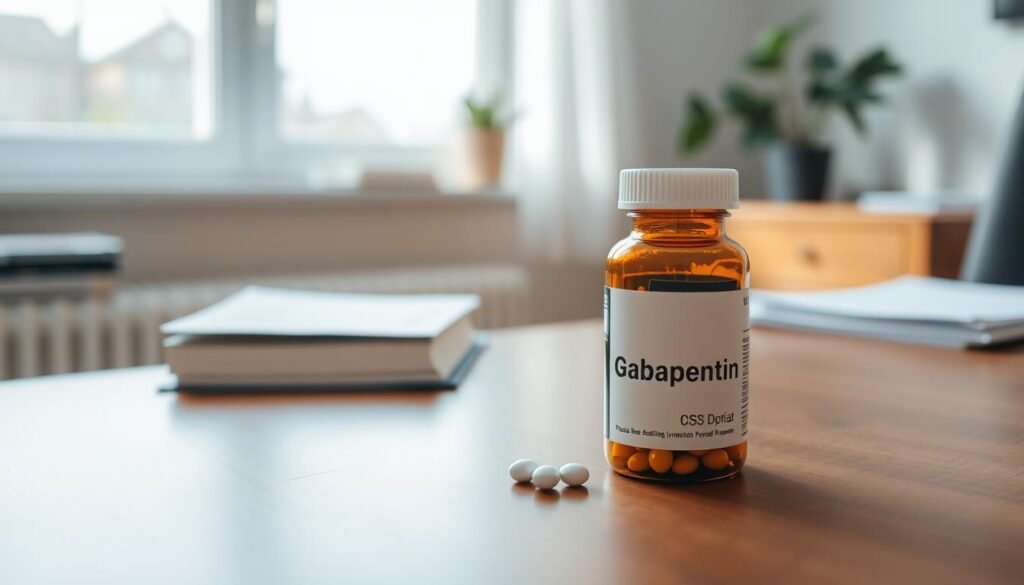Did you know almost 1 in 5 adults in the US have anxiety each year? It’s a big issue, affecting many people. Anxiety disorders are common, including generalized anxiety disorder (GAD). Instead of usual treatments like SSRIs and SNRIs, there’s a rising star. Gabapentin, often used for nerve pain and seizures, is also helping with anxiety. We’ll dive into how gabapentin works for anxiety, its benefits, and what users say.
Key Takeaways
- Gabapentin is used off-label for anxiety treatment, particularly for individuals unresponsive to standard medications.
- This medication mimics the calming neurotransmitter GABA, providing relief from anxiety symptoms.
- Gabapentin may take around three weeks or less to show improvement in anxiety conditions.
- Potential side effects include dizziness, drowsiness, and mood changes; serious side effects require immediate medical attention.
- A correlation exists between gabapentin dosage adjustments and levels of anxiety symptoms noted by patients.
Introduction to Gabapentin
Gabapentin was first made to treat epilepsy and chronic pain. Now, it’s also seen as a way to handle anxiety disorders. The FDA says it’s good for nerve pain and seizures. But doctors are also giving it to people feeling anxious. Around 300 million people worldwide face anxiety disorders, so we need good treatments like gabapentin.
Studies show gabapentin can help with different anxiety issues, like social anxiety and phobias. In one study, patients with breast cancer felt less anxious after taking gabapentin for four weeks. Many are interested in gabapentin because it’s an option when other anxiety medicines don’t work.
If you’re thinking about gabapentin for anxiety, talk to your doctor first. They’ll look at your health history, other medicines you take, and your health needs. Gabapentin is less risky than some drugs, but it can still cause tiredness, dizziness, and stomach upset.
It’s important to look closely at how safe and effective gabapentin is for anxiety. If you want to know more about natural ways to ease anxiety, check out this website.
What is Gabapentin?
Gabapentin is an anticonvulsant medication commonly sold under various gabapentin brand names. Names like Neurontin®, Horizant®, and Gralise® are well known. Originally, it was created to control seizures and nerve pain. Now, it also helps with gabapentin anxiety, especially in situations not originally approved for, like anxiety disorders.
Doctors often prescribe it for anxiety, even though it’s not officially approved for this. Gabapentin mimics a brain chemical called GABA, which makes people feel calmer.
Gabapentin is used for several conditions, including nerve pain from specific diseases. These conditions include postherpetic neuralgia and diabetic neuropathy. Patients can take it in capsules or tablets of various strengths. Most people start to feel less anxious around three weeks after beginning treatment.
Gabapentin can help control brain’s electrical activity, making it useful for anxiety. This can be important when usual treatments don’t work. For more details on using gabapentin for anxiety, check this link.
How Gabapentin Works for Anxiety
Gabapentin helps people understand their anxiety. It works by changing how brain chemicals act. This can help those with anxiety feel calmer.
Mechanism of Action
Gabapentin makes nerves less likely to cause anxiety. Studies say it helps with anxiety, even if it’s not its main use. A study on rats showed it could reduce anxiety, showing promise for people.
Comparison to Traditional Anxiety Medications
Gabapentin and other anxiety drugs work differently. It can be a good choice if other medicines cause problems. You can take up to 3,600 mg a day, but some doctors prescribe more. Yet, drugs like Xanax might work faster for anxiety relief.
| Medication Type | Mechanism | Common Dosage | Benefits |
|---|---|---|---|
| Gabapentin | Modulates GABA neurotransmitters | 300-4,800 mg/day | Alternative for medication intolerance |
| SSRIs | Increases serotonin levels | Varies widely, often starting at 20 mg | Effective for long-term use |
| Benzodiazepines | Enhances GABA-A receptor activity | 0.25-10 mg, depending on the drug | Quick relief from acute anxiety |
Not everyone will find gabapentin effective for anxiety. More research is needed to know its place among anxiety treatments. Adding therapy to gabapentin may help improve mental health for those with anxiety.
Gabapentin Used For Anxiety: Benefits
Gabapentin has become popular for its use in treating anxiety. Originally made for nerve pain, it helps those with anxiety. Studies show it’s good at reducing symptoms and panic attacks.
Improvement in Anxiety Symptoms
Gabapentin treatment has helped many with their anxiety. It makes people less irritable and more stable emotionally. A study on breast cancer survivors found major anxiety relief after eight weeks.
Reduction in Panic Attacks
It’s especially helpful for people with panic disorders. Research connects gabapentin to fewer and less intense panic attacks. This change improves their life quality a lot.
Management of Associated Conditions
Gabapentin also tackles conditions linked to anxiety, like insomnia and addiction. It helps people relax and sleep better. As part of a broader treatment plan, it supports mental health well.
It uses a comprehensive approach for treating anxiety. Combining different therapies enhances its effectiveness. Many find this multifaceted strategy beneficial.

| Condition | Gabapentin Effects |
|---|---|
| Anxiety Symptoms | Significant Improvement |
| Panic Attacks | Reduction in Frequency and Severity |
| Insomnia | Enhanced Sleep Quality |
| Substance Use Disorders | Support in Management |
For more details on gabapentin for anxiety, check out this in-depth article.
Off-Label Uses of Gabapentin
Gabapentin was first created for epilepsy. But now, it treats many other conditions. Many doctors prescribe it for other uses, with up to 95% of prescriptions being off-label. It helps with migraine prevention, fibromyalgia, and anxiety disorders like gabapentin generalized anxiety disorder.
Gabapentin is also used for chronic pain and mental health problems. Between 2012 and 2016, its prescriptions in the U.S. jumped by 64%. Many specialists find it effective for treating several symptoms at once. This makes gabapentin a go-to option when other treatments fail.
However, gabapentin’s off-label use has raised concerns about misuse, especially among those with substance use disorders. Research shows that 15% to 22% of these individuals may abuse gabapentin. This highlights the need for doctors to prescribe it carefully and think about the ethics of off-label use.
| Condition | Remarks |
|---|---|
| Migraine Prophylaxis | Used to prevent migraine attacks effectively. |
| Fibromyalgia | Shows promise in addressing chronic pain symptoms. |
| Generalized Anxiety Disorder | Emerging treatment option for anxiety management. |
| Substance Dependence | Explored as a potential aid in addiction recovery. |
| Neuropathic Pain | Recommended by CDC as a first-line agent. |
Gabapentin is researched a lot because many doctors prescribe it for reasons not listed on the label. It offers hope for better patient care. But, it’s important to use it wisely to avoid problems.
Dosage Guidelines for Gabapentin in Anxiety Treatment
Finding the right gabapentin dose for anxiety is key to effective treatment. It starts with a low dose to see how the patient reacts to the medication. This careful method ensures a treatment plan that fits their needs well.
Starting Dosage
The usual beginning dosage of gabapentin is 300 mg per day. Depending on how the individual responds and tolerates it, adjustments might be made. The goal is to find the right balance, increasing the dose for better results while watching for side effects.
Adjustments Over Time
Adjusting the gabapentin dosage might be needed as treatment goes on. Dosages for anxiety relief range from 300 mg to 3,600 mg daily. Usually, high doses are given in three smaller parts during the day. This helps lower side effects and increase benefits.
Doctors regularly check the patient’s progress to fine-tune the treatment. They make sure everything is working well, especially after the first four weeks. It’s essential to adjust the dose based on how the patient is doing.
Understanding gabapentin dosage adjustments is crucial for overcoming anxiety. For more on why anxiety happens and how the brain’s chemicals play a part, visit this resource.
Potential Side Effects of Gabapentin
Understanding the potential gabapentin side effects is key for anyone thinking of taking this medication. While a lot of people do not have problems with gabapentin, it has its risks. Everyone should know the common and rare side effects to better manage their treatment.
Common Side Effects
Several side effects are often seen with gabapentin use. These include:
- Tiredness
- Dizziness
- Headaches
- Nausea
- Weight gain
- Memory loss
These gabapentin side effects might happen to more than 1 in 100 people. They can be bothersome but are usually not severe. Yet, it’s important for doctors to keep an eye on patients, especially when starting.
Serious and Rare Side Effects
Some gabapentin adverse reactions are serious and need quick attention. These rare, but critical, side effects include:
- Allergic reactions with swelling of the lips, throat, or tongue
- Suicidal thoughts or big mood changes
- Signs of liver or kidney problems
- Unexpected muscle pain or unusual bruising
With severe tiredness, hallucinations, or skin turning yellow, get help right away. Always talk to a doctor before stopping gabapentin to avoid problems like seizures or making symptoms worse. For full side effects, visit this list.
Gabapentin Anxiety Reviews and Success Rates
People have different views on gabapentin for anxiety. Many have found it helps them feel much better. Clinical studies are also looking into how well it works for this. But, understanding both patient reviews and success rates is key for treatment plans.
Patient Testimonials
Many have seen their anxiety improve with gabapentin. Key points from their stories include:
- Doses of 300mg or more quickly lowered anxiety for many.
- Some felt a huge relief from anxiety symptoms after adjusting their dose.
- GAD patients noted that steady, higher doses greatly boosted their life quality.
Study-Based Outcomes
Research on gabapentin for anxiety shows varied results. Looking at 988 abstracts, 219 were relevant to its psychiatric use. Here’s a summary of what was found:
| Study Type | Findings |
|---|---|
| Clinical Trials on Anxiety Disorders | It worked better than a placebo in some, but not all, studies. |
| Panic Disorder Studies | No better than placebo for panic disorder symptoms. |
| Social Phobia Research | Did not offer significant help for social anxiety versus placebo. |
| Bipolar Disorder Trials | Helpful in certain bipolar cases as an add-on, but not alone. |

Patient stories and study data together offer insights into gabapentin’s role in anxiety treatment. Tailoring the dose may boost its effect, showing the need for focused research to find the best ways to use it.
Alternatives to Gabapentin for Anxiety Treatment
While gabapentin helps with anxiety, there are other ways that might fit your needs better. These options give new ways to handle anxiety. Think about these alternatives as part of your treatment.
Traditional Medications
There are quite a few medications other than gabapentin that help with anxiety. Let’s look at some of them:
- Selective Serotonin Reuptake Inhibitors (SSRIs): Medications like escitalopram and duloxetine work well for anxiety disorders. They can have side effects like nausea and sexual dysfunction.
- Serotonin Norepinephrine Reuptake Inhibitors (SNRIs): These also tackle anxiety symptoms and have similar side effects to SSRIs.
- Benzodiazepines: Drugs such as clonazepam act fast but may lead to dependence. Common side effects include dizziness and sleepiness.
- Tricyclic Antidepressants: Amitriptyline is used for anxiety but might cause constipation and dry mouth.
Therapeutic Approaches
Aside from medication, therapy offers other ways to manage anxiety:
- Cognitive Behavioral Therapy (CBT): This method helps change negative thoughts and build coping skills.
- Mindfulness and Relaxation Techniques: Meditation and deep breathing can lower anxiety.
- Exercise and Lifestyle Changes: Being active helps improve mental health and reduce anxiety.
- Natural Supplements: Things like vitamin B12, zinc, and cayenne pepper can be natural alternatives for anxiety relief.
Consulting a Healthcare Professional
When you think about trying gabapentin for anxiety, it’s key to talk to a healthcare pro. They will look at your medical past and check your symptoms closely. A doctor can suggest the right gabapentin plan just for you.
It’s important to go over the possible risks and good points of gabapentin. Side effects like feeling dizzy, tired, or having blurry vision might happen. By talking regularly, your doctor can tweak your dose. This often starts at 300 mg daily and might go up based on how you respond. Some people may need up to 1,200 mg a day, split into a few doses.
Along with gabapentin, try adding healthy habits. Things like working out, eating well, and practicing mindfulness can really help with anxiety. Chatting with your doctor about these options is a great way to attack anxiety from all sides.

| Key Considerations | Details |
|---|---|
| Starting Dosage | 300 mg per day |
| Maximum Dosage | Up to 1,200 mg per day |
| Common Side Effects | Dizziness, fatigue, headaches, blurred vision |
| Caution Required | Yes, as gabapentin is a controlled substance in several states |
| Combination Strategies | Exercise, diet, mindfulness |
Keep all this in mind for a smooth treatment path. Talking with a healthcare expert is crucial for managing anxiety well.
Taking Gabapentin for Anxiety: What to Expect
Knowing what to expect with gabapentin for anxiety helps patients. The gabapentin effectiveness timeline differs for each person. This affects when they might start feeling better. Some see changes in three weeks. But, for others, it could take longer. Body chemistry, dosage, and health affect this timing.
Timeline for Effectiveness
At the start, some people quickly feel better. For others, the change is slower. Knowing this is crucial for healing.
Monitoring Progress
Seeing your doctor regularly is key. These visits help adjust the dose and spot side effects. Keeping open lines of communication ensures treatments fit your needs. It supports patients during their journey too.
Conclusion
Gabapentin shows promise as an anxiety treatment, especially for those who haven’t found success with traditional methods. Various studies have shown it can greatly reduce anxiety symptoms. This makes gabapentin a key option to consider. Yet, more extensive research is needed to set firm guidelines and prove its effectiveness. The current results are promising, though.
Combining gabapentin with other treatments, like SSRIs, could improve anxiety management. Studies have found this mix could boost recovery chances by 60%. This approach not only makes gabapentin more effective but also supports a more complete way to handle anxiety. It helps people move toward a better overall state of well-being.
Gabapentin is now one of the most prescribed drugs in the U.S., showing its widespread use. It’s essential for patients to talk with healthcare providers before starting gabapentin. Healthcare professionals will create a tailored treatment plan that best suits each person, helping them find relief from anxiety. For more details on gabapentin, you can check out the case study here.